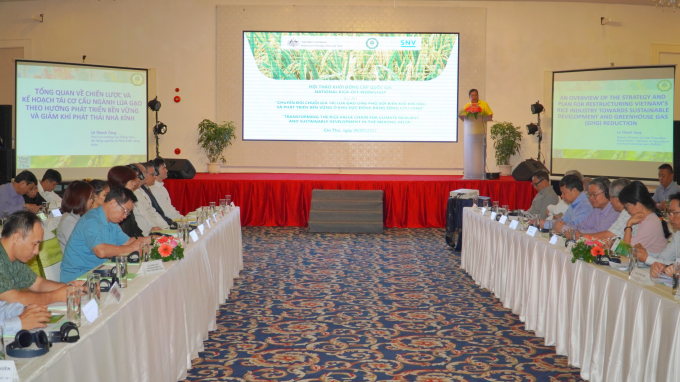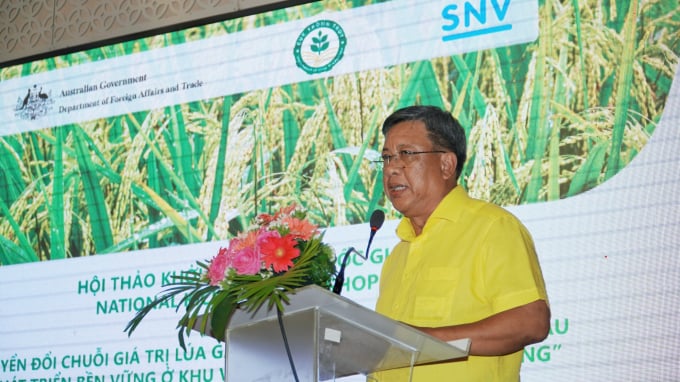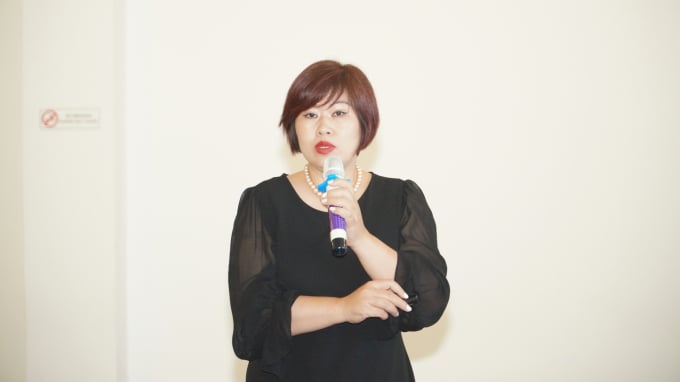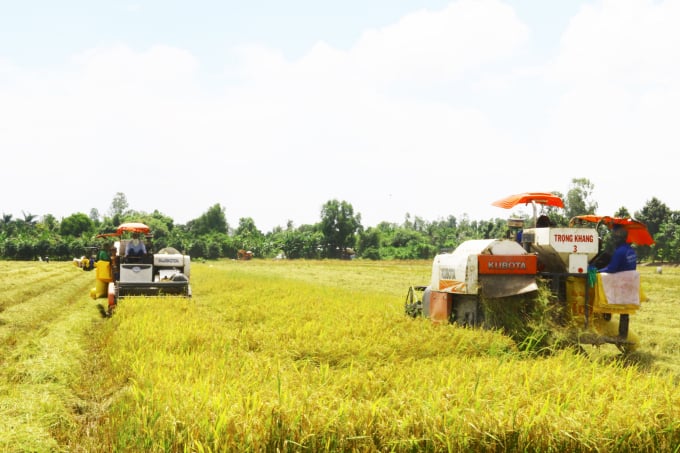November 25, 2025 | 23:20 GMT +7
November 25, 2025 | 23:20 GMT +7
Hotline: 0913.378.918
November 25, 2025 | 23:20 GMT +7
Hotline: 0913.378.918
The Netherlands Development Organization (SNV) in collaboration with the Department of Crop Production (Ministry of Agriculture and Rural Development) co-organized the National Kick-off Workshop for the Project “Transforming Rice Value Chains for Climate Resilient and Sustainable Development in the Mekong Delta (TRVC Project)”.

Overview of the National Kick-off Workshop for the TRVC Project. Photo: Kim Anh.
At the workshop, Deputy Director of the Department of Crop Production Le Thanh Tung said, “The agricultural industry annually emits more than 88 million tons of CO2 and is responsible for approximately 75% of methane emissions. The field of rice production in particular accounts for 50% of the total emissions in agriculture.”
Mr. Tung pointed out that in the Mekong Delta region, for many years localities had mainly set goals toward economy and food security, but have not paid much attention to emission reduction. Moreover, localities do not have mechanisms to encourage farmers to reduce greenhouse gas emissions. In addition to the factors of infrastructure conditions, management of greenhouse gas emission sources remains limited, leading to farmers’ poor awareness.

According to Mr, Rung, the field of rice production in particular accounts for 50% of the total emissions in agriculture. Photo: Kim Anh.
The Ministry of Agriculture and Rural Development has approved the 2025 - 2030 Project on Rice Industry Restructuring in Vietnam - vision to 2045. The main focus is to maintain rice cultivation area at 3.5 million ha and minimum overall output at 35 million tons to ensure food security in the country which contributes to keeping the stability of rice cultivation area for many years to come.
According to Mr. Tung, rice export output would decrease and maintain at 4 million tons/year until 2030. He assessed that this was the highest level of safety for rice production. On the other hand, rice production could add value by making good quality rice in service of export while reducing the amount of low value rice. Changes could be made in the farming process to ensure food safety and hygiene, adapting to the requirements of importing countries. “This is the direction suitable with the recent rice variety structure in the Mekong Delta region.”
“AUD 10-15 million will be invested in the national project “Transforming Rice Value Chains for Climate Resilient and Sustainable Development in the Mekong Delta.” That was the information given at the workshop by Ms. Tran Thu Ha, TRVC Project Director.

Ms. Tran Thu Ha, TRVC Project Manager, said that AUD 10-15 million will be invested for farmers in the Mekong Delta with the goal of reducing emissions in rice production. Photo: Kim Anh.
Building on the success of the project "AgResults Vietnam Emissions Reduction Challenge Project” (AVERP) in Thai Binh province, SNV continues to work with Vietnamese government partners to design the TRVC project. The project aims to encourage cooperatives, rice producers, traders, and enterprises that are producing and trading in the rice value chain in order to promote the application of advanced, intelligent, climate-adaptive rice production technologies on a large scale.
Accordingly, in 5 years from 2022 to 2027 the TRVC Project is expected to support livelihood development for approximately 300,000 rice farming households, 5 - 10 rice producing, processing and trading units, and 50 - 60 cooperatives. The project will thereby aim to reduce emissions by approximately 200 thousand tons of CO2, saving 15% of input costs for farmers, and thus create a 5% increase rate in terms of productivity and profit.

The TRVC Project is expected to support livelihood development for approximately 300,000 rice farming households in the Mekong Delta. Photo: Kim Anh.
The planned implementation locations are in three key rice-producing provinces in the Mekong Delta, namely An Giang, Kien Giang and Dong Thap. The project uses a reward-based mechanism from recorded results.
Interested enterprises can submit proposals for sustainable rice production techniques that bring higher economic efficiency and reduce greenhouse gas emissions, and at the same time present the enterprises’ capacity in testing and expanding the application of technology on a large production scale in the Mekong Delta. The SNV unit will provide information about the contest, participation rules, regulations, time and prize structure on the mass media and website of the Department of Crop Production and the Department of Agriculture and Rural Development of An Giang, Kien Giang, and Dong Thap.
Applications can be sent through emails to TRVC@snv.org.
Translated by Samuel Pham
/2025/11/24/3536-2-112800_176.jpg)
(VAN) Dong Nai now has tens of thousands of hectares of forests certified for sustainable management, and this area will continue to be expanded in the coming period.

(VAN) Vinh Ha hamlet (Dai Xuyen commune, Hanoi) is shifting away from small-scale farming as households adopt bioscurity into their breeder chicken models.

(VAN) Heavy rains make aquatic species more vulnerable to disease. Proactive water management and high-tech systems help farmers prevent outbreaks and protect yields.

(VAN) Greenhouses are shifting production mindsets in Binh Lu commune, enabling farmers to ‘weather the sun and rain’ and secure stable vegetable harvests throughout the year.

(VAN) Green transition is crucial for the Mekong Delta amid climate change and stricter standards, offering a path toward sustainability.

(VAN) Dong Thap promotes agricultural restructuring, forms large specialized farming zones, raises the value of agricultural products and develops toward ecological and high-tech directions.
/2025/11/22/4018-4-213342_747.jpg)
(VAN) The Mekong Delta Agricultural Experts Club has attracted 143 experts and researchers to participate in providing consultancy and contributing initiatives to the development of one million hectares of high-quality rice.